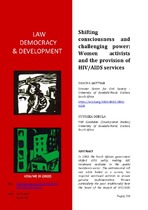Shifting consciousness and challenging power: Women activists and the provision of HIV/AIDS services
Abstract
In 2003, the South African government shifted AIDS policy making HIV treatment available in the public healthcare sector. The antiretroviral roll out, while hailed as a success, has required continued activism to ensure genuine implementation. Women particularly the poor, traditionally bear the brunt of the impact of HIV/AIDS socially and economically. Very often they do this in most marginalised spaces. This paper draws on theories of participation and empowerment to understand female activism during the period of antiretroviral roll out in South Africa. The paper seeks to understand how processes of empowerment linked with the first stage - access to ARVs impacted on the second stage - ARV roll out .It also considers how female activists understand their empowerment in the context of their role. The focus is grassroots activism females in Lusikisiki and Khayelitsha. This paper draws from a qualitative study on bottom-up policy advocacy utilising participatory observation and in-depth interviews with activists and civil society organisations. The main findings are that during the roll out phase of the HIV/AIDS campaign women activists worked from transformed "ways of thinking and being" in terms of HIV/AIDS and in terms of their role in the struggle for health rights. Their contesting embedded notions of power contributed to the democratisation of HIV/AIDS services. The transformation also caused shifts in the ways women mobilised, framed their understanding of the struggle and accessed participation spaces.

